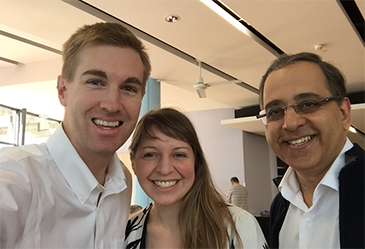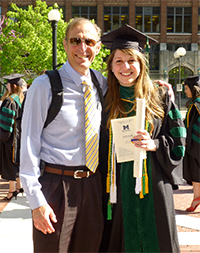Recent graduates Lesley Everett, MD, PhD and Clay Bavinger, MD, spent April on a rotation at Paris’ Institut de la Vision and at some of the city’s largest hospitals. Their visits were part of a first-of-its-kind international experience that leaders at the Kellogg Eye Center hope to make a continuing program.

“Because we were the first, I didn’t really know what to expect,” said Everett, who just added a PhD in human genetics to her MD. “For me, it was the perfect blend of clinical work and the gene therapy research work I was doing. It was a natural fit.”
She and Bavinger, who also graduated from U-M Medical School in May, were placed at the Institut de la Vision because of its renown. Founded less than decade ago, it is already recognized as one of most advanced clinical and research centers in Europe for eye diseases. For several years, Kellogg Eye Center leaders have been building professional relationships with Institut de la Vision’s founder, noted French ophthalmologist José-Alain Sahel, MD, PhD, and some of his colleagues, said U-M Ophthalmology Professor Jonathan Trobe, M.D.
“These are the top eye care centers and the top research institution in Europe. They are really on the cutting edge, doing things that have never been done before,” Dr. Trobe said. “For us at the Kellogg Eye Center, this is a natural institutional partner. For our students, it presents an incredible opportunity to experience care under a different system and setting – something they would never get here.”
With financial support from Global REACH and from the Kellogg Eye Center for International Ophthalmology, Bavinger and Everett enjoyed rotations tailored to their academic and professional interests. Bavinger spent much of the month at Rothschild Hospital, founded a century ago as a center for ophthalmic disorders. He was also involved in a research project at Hôpital Lariboisière, where he studied retinal vascular density.
“We were using a device that allows you to calculate the density of blood vessels in the retina. The technology is brand new. Hardly anyone has it, so that was exciting,” said Bavinger, who is preparing to begin an ophthalmology residency at the University of Pennsylvania, in Philadelphia. “The experience reinforced the fact that I’m very interested in research and my passion to pursue an academic career.”

Everett, who is now headed for her ophthalmology residency at the University California San Francisco, spent most of the month working in an Institut de la Vision lab, using genome sequencing to help identify the genes responsible for various inherited retinal diseases.
“The experience really reaffirmed my enthusiasm for retinal genetics and helped show me even more potential opportunities in that field,” she said. “I’m very thankful to everyone who supported the experience. It was tremendously valuable and educational – the perfect introduction for my upcoming residency.”
Leaders at Kellogg, meanwhile, are already planning for future student exchanges down the road.
“We’re discussing lots of exciting possibilities because we recognize the potential benefit for collaborative research and for exchanges of medical trainees on both sides of the ocean,” said Dr. Trobe. “This venture went extremely well, thanks to help from Laura McMaster, MSc, at Rothschild Hospital, and to Katia Marazova, MD, at the Institut, who coordinated the activities. I also give much credit to our two students. Both were the perfect ambassadors for this exciting new program.”
